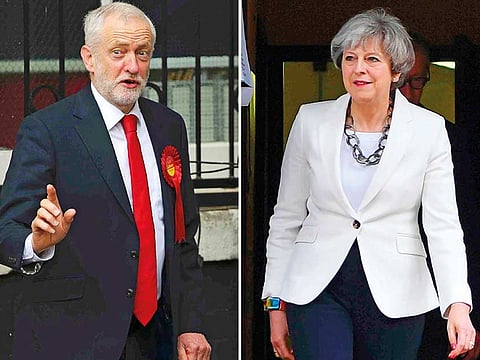May’s UK election gamble backfires
British Prime Minister sought a strong majority for Brexit negotiations, instead she’s been handed a likely minority government

Madrid: British Prime Minister Theresa May took the biggest gamble of her political career in calling a snap general election.
But early results and exit polls show the Conservative leader was the loser – failing to win the increased majority she so desperately wanted to negotiate a Brexit deal with the other 27 members of the European Union.
On dissolution May’s Conservatives held an overall majority of 330 seats of the 650 in the House of Commons.
Exit polls and seat-projections immediately after Thursday’s general election showed her party on course to take 318 seats – still the largest party in Westminster but eight seats short of an overall majority.
Early headlines in the London Sun tabloid newspaper screamed MAYHEM! At the prospect of a hung Parliament, where no party held enough votes to form a government on its own.
Labour, under Labour leader Jeremy Corbyn, looked likely to pick up 267 seats, up from the 229 the party held on dissolution. It made early seat gains in Scotland, Wales and the northeast and Midlands of England.
Alex Salmon, the former First Minister for Scotland said: “It’s not clear who has won this election – but it’s very clear who has lost, and that’s Theresa May. Her inadequacies have been exposed.
Speaking after her re-election in the constituency of Maidenhead to the west of London, May appeared shaken and said: “At this time, more than anything else, this country needs a period of stability,” she said. “It is incumbent on Conservatives to provide stability.”
Speaking after his re-election in the Islington-North seat in London, Corbyn said: “This election was called by the Prime Minister for a large majority to assert her authority. Politics have changed, People have said they have had quite enough of austerity police. The mandate she has is lost Conservative seats, lost votes, lost confidence,” adding that “it’s time for her to go.”
Tom Watson, the deputy leader of the Labour Party said that May was a damaged prime minister and her authority was undermined.
“We know the people voted for hope,” he said after retaining his Birmingham-area seat.
Analysts and commentators said that Labour’s support came from a large number of young people who were drawn to Corbyn’s campaign style.
Nigel Farage, a former leader of Ukip, the United Kingdom Independence Party, described May’s election call as “a huge mistake” and said that if a Corbyn-led coalition took control of the government, Brexit was in danger.
“Mrs May went for the big majority and she was found out,” he said, saying the Britons were now “looking down the barrel of a second Brexit referendum.”
He said that even if May scrapes back into power with a minority government, she was in a very weak negotiation position for the Brexit talks.
“Her leadership of the party is fatally damaged,” he said.
If the results pan out as expected, May’s position as leader of the party is vulnerable, her Brexit negotiating hand is considerable weakened and she may have to rely on support from any Members of Parliament elected by the Democratic Unionist Party based in Northern Ireland. The DUP said it would be willing to work with May, and it had won ten seats by 3:45am BST.
She is unlikely to tempt the Liberal Democrats into a governing coalition as former Prime Minister David Cameron did in 2010.
The Lib Dems look like winning a dozen seats but tweeted after the polls closed that they would not be holding talks or entering coalition deals with any party. The Lib Dems want a second referendum on Brexit. Former Deputy Prime Minister Nick Clegg lost his seat in Sheffield Hallam last night. Vince Cable, a former minister in the Conservative-Lib Dem coalition, regained his seat in Twickenham. He told the BBC that the hard Brexit approach adopted by May was finished, and that the whole approach of Brexit would need to be rethought, with a softer more inclusive agreement required.
The last time there was a hung Parliament in Westminster was in February 1974, with a second general election following six months’ later.
Kenneth Clarke, the longest-serving MP who has been at Westminster since 1970, told the BBC: “A hung Parliament would be the worst possible outcome for the nation.”
In early Asian trading, the pound fell by nearly 2 per cent against the US dollar as financial markets reacted to the prospect of May’s projected seat losses and hung Parliament.
Labour peer Lord Peter Hain said that May has won the worst campaign of any party leader in recent times, and there was a kickback against her arrogance, her reluctance to engage with voters and her demand for a large majority.
Brexit negotiations are due to begin on June 19.
But one of the biggest losers of the night appeared to be the Scottish National Party. Heading in to Thursday’s vote, the party held 56 of the 59 seats in Scotland. Exit polls suggested the SNP would hold just 32 or so.
UK bookmakers changed the betting odds for Boris Johnson, the UK’s Foreign Secretary becoming the next leader of the Conservative party from 66-1 to 5-1 as speculation mounted over May’s leadership and decision to call the snap general election.
Ukip, which had pushed for last year’s Brexit referendum, saw its vote collapse nationwide, with its previous support shifting almost evenly to Labour and Conservative in early returns.
May called the general election two years into a five-year fixed term in search of a strong mandate for the Brexit talks. When the snap election was called at the end of April May’s party had a 20 percentage point lead over Labour in opinion polls.



